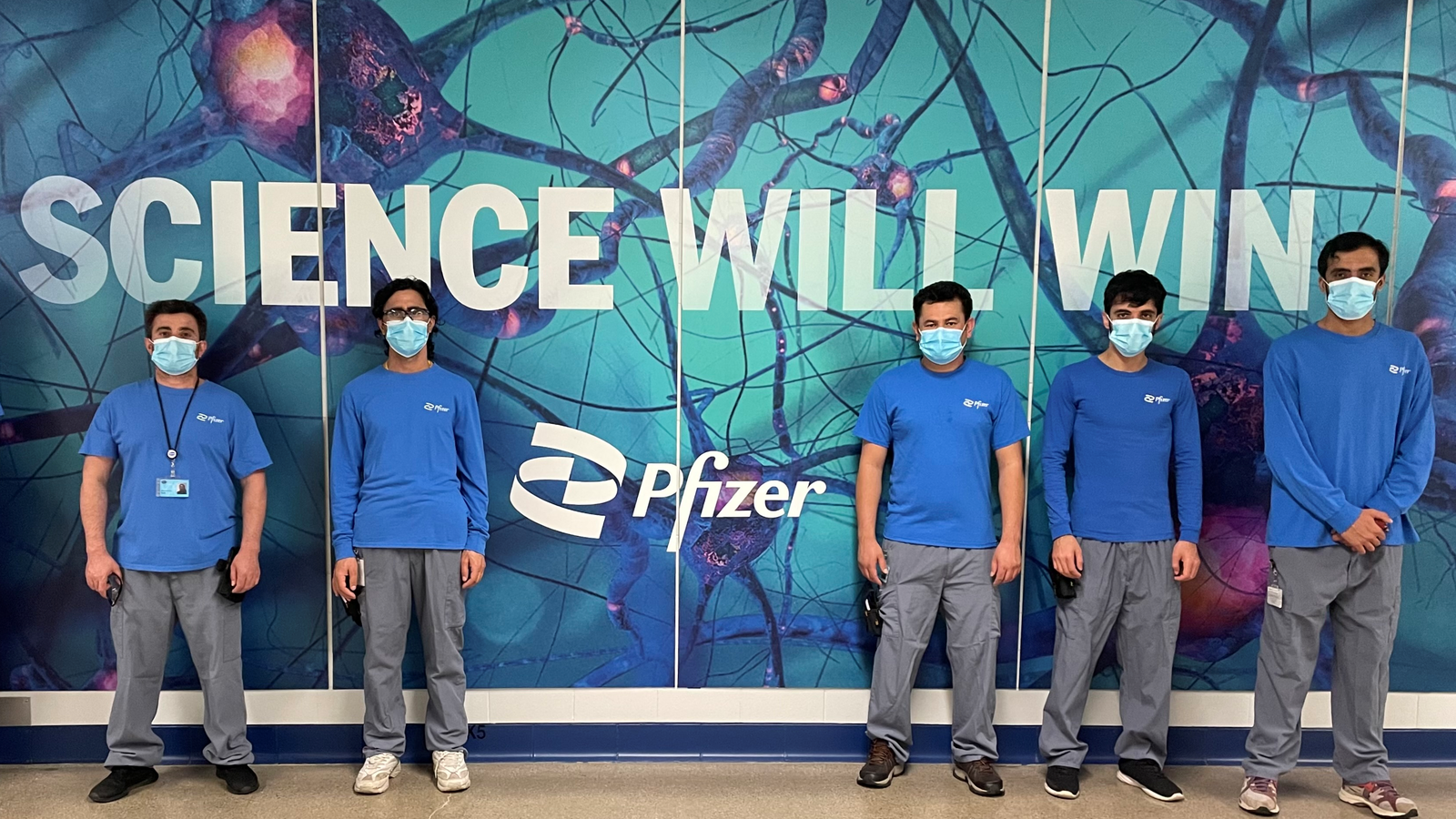Pfizer’s Refugee Hiring Program Changes Lives

As Mona Babury tells it, Pfizer’s refugee hiring program was born out of the basic human need to connect during a time of shared anguish.
Wanting to help: Last August, Babury, the pharmaceutical company’s director of global diversity, equity and inclusion, was horrified by news coverage of the Taliban taking over Afghanistan and refugees fleeing.
- Babury’s husband had fled Afghanistan for the United States with his family at the age of 5, some 40 years before, so she had a personal connection to the events unfolding.
- She felt an urge to talk to someone who would understand, so she turned to Pfizer Executive Vice President and Chief People Experience Officer Payal Sahni, also a former Afghan refugee. In the course of their conversation, an idea popped into Babury’s head.
Lightbulb moment: “I said, ‘Why don’t we create a refugee hiring program? It will give [refugees] a glimmer of hope when they’re coming here with just the clothes on their backs,’” Babury recalled. “Within minutes, she responded, ‘Go for it.’”
Making it a reality: Pfizer, which had close to 1,000 job openings it was looking to fill, had never created a refugee hiring program before. “We didn’t have a playbook,” Babury said.
- The team decided to research similar initiatives, and in doing so contacted The Tent Partnership for Refugees, a nonprofit organization established by Chobani founder Hamdi Ulukaya to help businesses hire and train refugees.
- Thanks to Tent’s help, Pfizer’s Refugee Leadership Initiative was launched in mere days, with Babury named as its leader.
- Its goal? Hire a minimum of 100 refugees by the end of 2022 and provide mentorship opportunities to an additional 150—with 50 of these opportunities earmarked for LGBTQ+ refugees.
Following through: In less than a year, the initiative is well on its way to reaching its goal—having hired 68 refugees so far. The enthusiasm from Pfizer’s workforce has been immediate and widespread.
- After sending an email announcing the program globally, “we had 300 colleagues email back [within a few hours] saying they wanted to volunteer, to support us in any way they could,” said Babury.
- At Pfizer’s Kalamazoo, Michigan, facility, where the initiative has been most successful, “one [team] leader took this very personally,” hiring 18 Afghan refugees since the beginning of 2022, said Babury. In partnership with a local refugee agency, he has also made “a commitment to continue to further ramp up hiring efforts.” (Learn more here.)
Going above and beyond: Pfizer, which now works directly with the not-for-profit humanitarian organizations Tent for Refugees, Welcome.US, the International Rescue Committee and eight other resettlement agencies to source and hire refugees, does more than extend job offers.
- Though the new employees do not require sponsorship to work in the United States, owing to their refugee status, they do need help restarting their lives. Pfizer provides up-front bonuses to help cover the costs of transportation to and from work and to help them obtain driver’s licenses.
A winning formula: Seeking out refugees as employees can be an enormously rewarding sourcing strategy for a manufacturing company, Babury said.
- “The knowledge curve might be a little [steeper], but in the end, there’s so much data that shows refugee hiring pays off immensely,” she said. “They’re very hardworking, loyal and thankful for the opportunity to enter a new workforce.”
A proud moment: “I am so proud of the incredible progress we have made in support of this important and impactful initiative,” said Pfizer Chief Global Supply Officer Mike McDermott. Pfizer Global Supply, Pfizer’s manufacturing and supply organization, has hired the most refugees at Pfizer to date.
- “Our smart, talented and dedicated new colleagues are already making a difference. We welcome their fresh perspectives and have been motivated by their pride and passion,” he continued.
- “I’d also like to recognize our PGS colleagues for welcoming these new teammates with open arms, supporting them both professionally and personally,” he added. “Everyone deserves a fresh start, and we consider it an honor and a privilege to play a role in the new chapters for these refugees and their families.”
Success stories: The backgrounds of many of the recent hires are as impressive as they are diverse.
- The very first refugee hire, a man named Afzal Afzali, had been working for the U.S. embassy and the American University of Afghanistan when the Taliban seized control last summer. “He had to make a decision to escape within a few hours of the invasion,” according to Babury. “On his way out, he rescued four unaccompanied children protected by the U.S. government and reunited them with their mother in the United States.”
- Afzali, who now lives with his family in Texas and works at Pfizer in procurement, told the company the new job has led him to finding his “life’s purpose in serving others … likewise, Pfizer is all about breakthroughs that change patients’ lives.”
- Another new employee had previously worked with the Afghan president. She is now a senior associate on Babury’s team. She was recruited through the Pfizer Refugee Leadership Initiative Mentorship program.
The last word: Seeing the success of these new employees energizes those around them, said Babury.
- “The leader at our Kalamazoo site will speak to you with such a light in his eyes about how … once these hires have a job, they don’t consider themselves refugees anymore. They’re people with jobs. They have a way to take care of their families. There is a sense of pride among all our colleagues because of this program.”